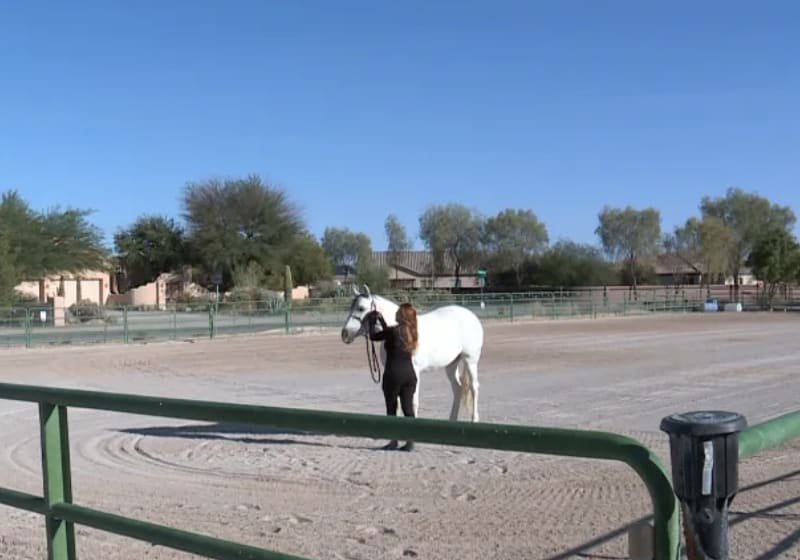Equine veterinarian shortage in Las Vegas: industry experts explain ongoing issue

Equine veterinarian shortage in Las Vegas: industry experts explain ongoing issue
By Sasha Loftis
As a nationwide equine veterinary shortage continues to impact Las Vegas, industry experts spoke with 8 News Now about what’s causing the issue and their efforts to turn it around.
Like many others across Southern Nevada, for Jamie Caparulo, horses are everything.
“Being a horse owner is just genetically in my blood for generations,” Caparulo said. “My mom had horses; her mom rode.”
She boards her horse, Arya, at a stable in the northwest valley, where she has made her mark in our local animal world.
“I was so surprised,” Caparulo said. “I moved here from L.A. and I had no idea that Vegas had this type of horse community.”
An estimated 34,100 domesticated horses are living across Nevada, according to the latest data from HorseProperties.net. Many of those animals are kept in Las Vegas.
The number of large animals and their owners need veterinary care, and it’s all coming from a single clinic.
“As the town has gotten bigger, it has certainly gotten harder,” Dr. Leslie Schur told 8 News Now. “Because the horses are on all four sides.”
Dr. Schur is a veterinarian with Desert Pines Equine. The medical and surgical center employs seven veterinarians and two veterinary interns, who serve all of Las Vegas and its surrounding areas.
Their heavy workload is one of many signs of a prominent equine veterinary shortage locally and across the United States.
“It’s not just here in Las Vegas,” Dr. Schur said. “It’s actually not even just in the United States; it’s everywhere.”
Of veterinary graduates every year, only five percent choose to pursue equine veterinary medicine, according to Schur. Of that small amount, half leave the profession within five years.
The problem stems from several factors, according to the American Association of Equine Practitioners.
The first correlates to a high level of debt. In 2022, the average student debt owed by a veterinary school graduate was $179,505, according to the American Veterinary Medical Association.
The second element is financial; equine or large animal practitioners make significantly less money starting than small animal veterinarians.
Though the average starting salary jumped from $65,000 to $95,000 in 2023, according to the AVMA, it’s still thousands lower than the $114,000 mean salary small animal practitioners make at the start of their careers, per 2022 data.
The third aspect of the shortage is burnout, per the AAEP. There is a more intense day-to-day physical demand for large animal veterinarians, along with a higher chance of regular on-call rotations for 24-hour emergency care.
Therefore, what is being done to change the trajectory? Dr. Schur told 8 News Now the response at Desert Pines Equine is multi-faceted.
“When the major leagues are looking for the next big baseball star,” Dr. Schur explained. “They’re not going to colleges, they’re going to the little league fields.”
The team encourages children of all ages to volunteer and work alongside current equine vets to help them gain experience and foster a future passion for the job.
Dr. Schur also spoke on an effort to change the industry narrative.
“I think at some point our own profession has been our own worst enemy,” she explained. “People get burned out, they get tired, and they dissuade the young people from going on.”
Dr. Schur also referred to a continued attempt to encourage current veterinary students to attend universities close to Nevada, then return to the state to practice.
In 2023, lawmakers approved Senate Bill 342, which allocates $8 million in financial aid to address the state’s critical veterinary shortage.
The Nevada Office of the Western Interstate Commission for Higher Education opened applications earlier this year for its 2025-2026 Health Profession Education Program stipend.
The HPEP supports students pursuing a career in veterinary medicine by lowering out-of-state tuition costs for 70 Nevada students enrolled in Utah State University’s veterinary program through 2034.
The stipend is set to help each recipient for four years.
Additionally, many veterinarians have advocated for the establishment of a veterinary school in Las Vegas.
“One of our problems right now, too, is that Nevada does not have a veterinary college,” Dr. Schur added. “There is some talk about opening one; we have had no contact with them.”
In June, Roseman University of Health Sciences submitted a letter of intent to the AVMA Council on Education for a proposed four-year Doctor of Veterinary Medicine (DVM) program; however, no concrete plans are currently in motion.
“Us trying to find students from Nevada, from Las Vegas proper,” Dr. Schur said. “Is very helpful.”
She said Desert Pines Equine is always doing what it can to hire more doctors and expand its physical footprint, with long-term plans to build a second surgery center on the current campus.
This is all to keep serving families in Las Vegas just like Caparulo and her horse, Arya.
“You have to obviously be very passionate about equine therapy and this whole world,” Caparulo concluded. “And I think there are a lot of people out there that are, I’m just surprised a lot of them haven’t found Vegas yet.”
Desert Pines Equine also has to plan for large equine events in Las Vegas every year, including the National Finals Rodeo in December, which brings in approximately 20,000 horses.
Dr. Schur told 8 News Now the clinic adds extra veterinarians during that time to help with the increased workload, including doctors to assist with the hospital and other emergency services.
